Health Risks and Allergies Related to Chia Seeds
Seeds of Risk: The Dark Side of Superfoods

Have you ever wondered if there are any downsides to the superfoods we love?
In this article, we explore the hidden risks of chia seeds, a popular superfood known for its numerous health benefits.
We’ll shed light on potential allergic reactions, the choking hazard it poses, and digestive issues it may cause.
Additionally, we’ll delve into how chia seeds can interact with medications, potentially increasing the risks associated with certain drugs.

Stay informed, stay healthy.
Key Takeaways
- Excessive consumption of chia seeds can lead to digestive issues and allergic reactions, so they should be consumed in moderation and with caution, especially for individuals with allergies or food intolerance.
- Chia seeds can pose a choking hazard if not consumed properly, and can also cause bloating and discomfort due to their ability to absorb liquid and expand in the stomach. Proper preparation techniques and sufficient hydration should be followed to prevent choking incidents and digestive issues.
- Chia seeds can interact with certain medications, affecting their absorption and metabolism. It is important to consult with a healthcare professional before incorporating chia seeds into your diet if you are taking medications to avoid potential drug interactions.
- While superfoods like chia seeds may offer health benefits, the scientific evidence supporting their claims is limited. It is crucial to approach superfoods with a critical mindset and consult with a healthcare professional or registered dietitian for personalized guidance and recommendations.
Potential Health Risks of Chia Seeds
We must address the potential health risks associated with consuming chia seeds.
While chia seeds are often praised for their numerous health benefits, it’s important to consider the long-term effects of consuming these tiny seeds.
Chia seeds are rich in fiber, omega-3 fatty acids, and antioxidants, which can promote heart health, aid digestion, and regulate blood sugar levels.

However, consuming excessive amounts of chia seeds can lead to digestive issues such as bloating, gas, and stomach discomfort. Additionally, the high fiber content of chia seeds may cause bowel obstruction in some individuals.
It’s crucial to consume chia seeds in moderation and ensure a balanced diet to avoid any potential adverse effects.
Transitioning into the subsequent section about allergic reactions to chia seeds, it’s important to be aware of the potential risks associated with consuming this superfood.
Allergic Reactions to Chia Seeds
Continuing the discussion on potential health risks of chia seeds, it’s important to address the allergic reactions that can occur from consuming this superfood. While chia seeds are considered a healthy addition to many diets, it’s crucial to be aware of the possibility of food intolerances and allergic reactions.

Here are four key points to consider:
-
Allergies: Some individuals may have allergic reactions to chia seeds, leading to symptoms such as itching, hives, or swelling.
-
Anaphylactic shock: In rare cases, consuming chia seeds can trigger anaphylaxis, a severe allergic reaction that requires immediate medical attention.
-
Cross-reactivity: Those with allergies to other seeds, such as sesame or mustard seeds, may be more prone to developing an allergic reaction to chia seeds.

-
Consultation: If you suspect a food intolerance or have a history of allergies, it’s advisable to consult with a healthcare professional before incorporating chia seeds into your diet.
As we move forward, let’s now explore the next potential risk associated with chia seeds: the choking hazard of swallowing them.
Choking Hazard: Risks of Swallowing Chia Seeds
Addressing the potential risks associated with chia seeds, it’s important to highlight the choking hazard that can occur from swallowing these small seeds. Chia seeds, although popular for their nutritional benefits, can pose a risk if not consumed properly.
To prevent choking incidents, it’s crucial to follow proper preparation techniques. Firstly, it’s recommended to soak chia seeds in water or other liquids before consuming. This helps to soften the seeds and reduce the risk of them getting stuck in the throat.

Additionally, it’s important to avoid consuming large quantities of dry chia seeds at once. Instead, sprinkle them on top of foods or blend them into smoothies to ensure proper hydration and prevent choking.
Digestive Issues Caused by Chia Seeds
Chia seeds can cause digestive issues. While these tiny seeds are often hailed for their numerous health benefits, it’s essential to be aware of the potential risks they can pose to our digestive system. Here are four digestive issues that can arise from consuming chia seeds:
-
Bloating: Chia seeds absorb liquid and expand in the stomach, which can lead to feelings of bloating and discomfort.
-
Gas: The high fiber content in chia seeds can cause increased gas production, leading to flatulence.

-
Constipation: Although chia seeds are often associated with aiding digestion, consuming them without sufficient hydration can actually worsen constipation.
-
Diarrhea: On the other hand, excessive consumption of chia seeds, especially when combined with inadequate liquid intake, can result in loose stools.
It is important to listen to your body and adjust your chia seed consumption accordingly.
Now, let’s delve into another potential concern: interactions with medications, specifically the risks of chia seeds in combination with certain drugs.

Interactions With Medications: Chia Seeds and Drug Risks
Let’s explore the potential risks of chia seeds in combination with certain medications.
Chia seeds have gained popularity as a superfood due to their nutritional benefits, but it’s important to be aware of their potential interactions with medications.
Chia seeds are rich in fiber, omega-3 fatty acids, and antioxidants, which can provide numerous health benefits. However, they can also affect the absorption and metabolism of certain medications, leading to potential drug interactions.
For example, chia seeds may interfere with the absorption of medications that require an acidic environment in the stomach. Additionally, the high fiber content of chia seeds can slow down the absorption of medications, reducing their effectiveness.
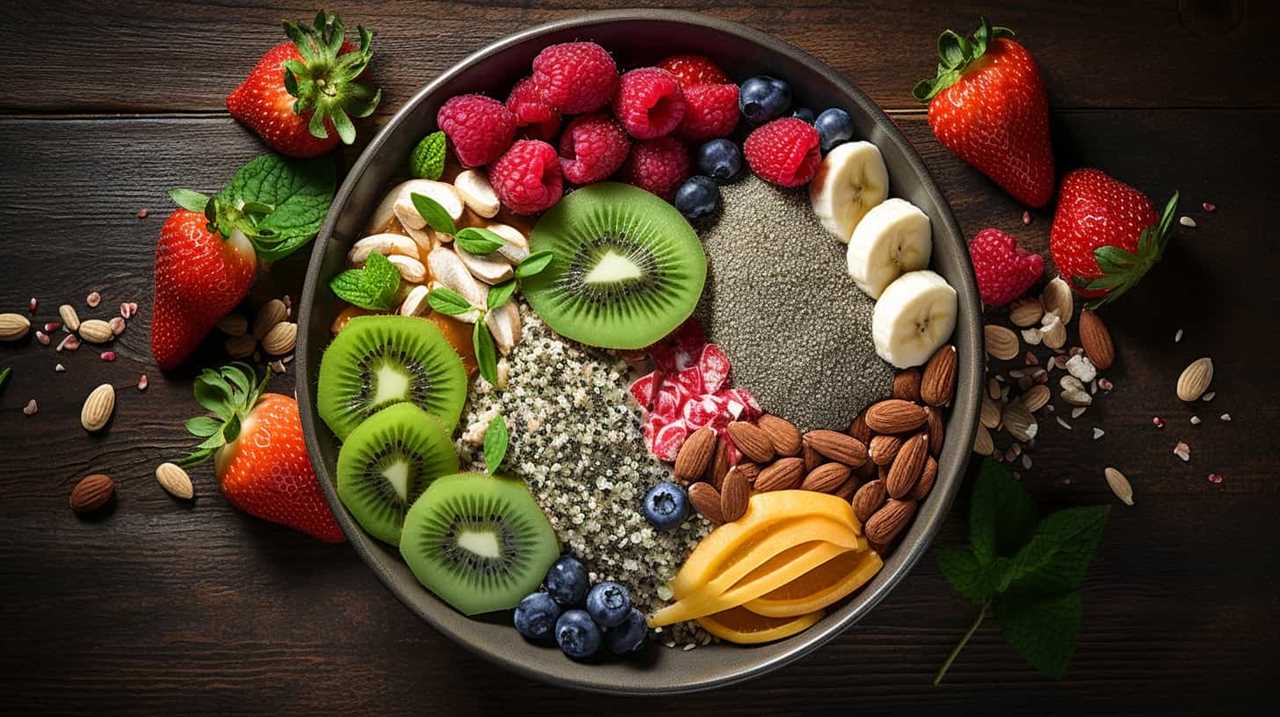
It’s crucial to consult with a healthcare professional before incorporating chia seeds into your diet, especially if you’re taking any medications, to minimize the risk of medication interactions and ensure your safety.
Frequently Asked Questions
Are There Any Other Potential Health Risks Associated With Consuming Superfoods Besides Chia Seeds?
There may be potential long term effects and nutritional deficiencies associated with consuming superfoods besides chia seeds. It is important to consider all possible health risks before incorporating these foods into our diet.
What Are Some Common Symptoms of Allergic Reactions to Chia Seeds?
Common symptoms of allergic reactions to chia seeds include hives, itching, swelling, and difficulty breathing. It’s important to be aware of potential health risks when consuming superfoods, as they can pose choking hazards and digestive issues, especially when combined with certain medications.
Can Swallowing Chia Seeds Whole Pose a Choking Hazard?
Swallowing chia seeds whole can indeed pose a choking hazard due to their small size and ability to absorb liquid. However, it’s important to note that chia seeds also offer various nutritional benefits when consumed responsibly.

Are There Any Digestive Issues Specifically Caused by Consuming Chia Seeds?
When it comes to potential digestive issues from consuming chia seeds, it’s important to consider their impact on gut health. While chia seeds are generally well-tolerated, some individuals may experience bloating or diarrhea.
Do Chia Seeds Interact With Any Specific Medications, and What Are the Potential Risks?
Potential drug interactions with chia seeds should be considered, as they may affect the absorption and metabolism of certain medications. It is important to consult with a healthcare professional to understand the potential risks and side effects.
Conclusion
In conclusion, while superfoods like chia seeds have gained popularity for their potential health benefits, it’s important to be aware of the potential risks they may pose.
Allergic reactions, choking hazards, digestive issues, and interactions with medications are some of the concerns associated with consuming chia seeds.

As the saying goes, ‘knowledge is power.’ Being informed about the potential risks can help us make informed decisions about incorporating superfoods into our diets.
Hi, I’m Sarah. I write for Turtle Tree Seeds, a news blog that loves food – all kinds of food. But especially bacon, chocolate, and veggies. We’re on a mission to show the world that you can enjoy all of those things, even kale and brussels sprouts. Because we believe that when it comes to food, there’s no such thing as guilty pleasures. Just pleasures.
I’m also a huge fan of puns (obviously).
Health Risks and Allergies Related to Chia Seeds
10 Best Unveiled Secrets: Allergic Reactions to Superseeds

Ladies and gentlemen, today we come together to unveil the hidden truths about allergic reactions to superseeds.
In this informative article, we’ll explore the symptoms, common reactions, and even severe cases of anaphylaxis. We’ll also delve into how chia seed allergies affect children and cross-reactivity with other superseeds.
Stay tuned as we discuss diagnosing and managing these allergies, along with tips for avoiding chia seed allergens. Plus, we’ll reveal alternative superseeds for those who suffer from allergies.
Let’s serve you the knowledge you deserve!

Key Takeaways
- Chia seed allergies can cause symptoms such as itching, hives, swelling, difficulty breathing, and anaphylaxis.
- Diagnosis of chia seed allergies involves a medical history, physical examination, skin prick test, and IgE blood test.
- Chia seed allergies are more prevalent in children aged 1-3 years, and genetic factors and family history of food allergies may increase the risk.
- Management and prevention of chia seed allergies include avoiding chia seeds, taking antihistamines for allergic reactions, and keeping emergency medication on hand.
Symptoms of Chia Seed Allergies
We have observed that some individuals may experience various symptoms when they have an allergic reaction to chia seeds. Diagnosing chia seed allergies can be challenging as the symptoms can vary from person to person.
Common symptoms include itching, hives, swelling, and difficulty breathing. In severe cases, chia seed allergies can lead to anaphylaxis, a life-threatening allergic reaction that requires immediate medical attention.
It is crucial to manage chia seed allergies by avoiding chia seeds and foods that contain them. Reading food labels carefully and asking about ingredients when dining out can help prevent accidental exposure.
If you suspect you have a chia seed allergy, it is important to consult with a healthcare professional for proper diagnosis and guidance on managing your allergy effectively.

Common Allergic Reactions to Chia Seeds
Common allergic reactions to chia seeds can include itching, hives, swelling, and difficulty breathing. These symptoms are indicative of an allergic response triggered by the ingestion or contact with chia seeds. It is important to be aware of these reactions in order to effectively manage chia seed allergies.
To further understand the symptoms and treatment options for chia seed allergies, let’s take a look at the following table:
| Allergic Reactions | Symptoms |
|---|---|
| Itching | Skin irritation and discomfort |
| Hives | Red, raised welts on the skin |
| Swelling | Facial or body swelling |
| Difficulty breathing | Shortness of breath, wheezing |
If you experience any of these symptoms after consuming chia seeds, it is crucial to seek medical attention immediately. Treatment options may include antihistamines to relieve itching and swelling, epinephrine injections for severe reactions, and avoidance of chia seeds in the future.
Managing chia seed allergies involves being vigilant about ingredient labels, informing restaurants about your allergy, and carrying emergency medication. Remember, it’s important to prioritize your health and well-being when it comes to managing food allergies.

Severe Allergic Reactions: Anaphylaxis
One of the most dangerous allergic reactions to chia seeds is anaphylaxis, which can be life-threatening if not treated immediately. Anaphylaxis is a severe allergic reaction that affects multiple systems in the body. Here are some important points to know about anaphylaxis:
-
Signs and Symptoms: Anaphylaxis can cause difficulty breathing, swelling of the throat and tongue, hives, dizziness, and a drop in blood pressure. It can progress rapidly and may lead to unconsciousness or cardiac arrest.
-
Prevention Strategies: The best way to prevent anaphylaxis is to avoid the trigger, such as chia seeds, if you have a known allergy. It’s also important to read food labels carefully and inform others about your allergy.
-
Emergency Response: If anaphylaxis occurs, immediate action is crucial. Administering epinephrine through an auto-injector, calling emergency services, and seeking medical attention are vital steps in managing anaphylaxis.

Chia Seed Allergies in Children
When it comes to chia seed allergies in children, it’s important to understand the symptoms and treatment options available.
Common symptoms may include hives, itching, and difficulty breathing, and it’s crucial to seek immediate medical attention if an allergic reaction occurs.
Additionally, it’s essential to be aware of the prevalence and risk factors associated with chia seed allergies in children to ensure their safety and well-being.
Symptoms and Treatment Options
As parents, it’s important for us to be aware of the symptoms and treatment options for chia seed allergies in children. Chia seed allergies are relatively rare, with a prevalence of less than 1% in the general population. However, certain risk factors, such as a family history of food allergies, increase the likelihood of developing an allergy to chia seeds.

When it comes to diagnosing chia seed allergies in children, it’s crucial to pay attention to the following symptoms:
- Skin reactions: Children may experience hives, itching, or eczema after consuming chia seeds.
- Digestive issues: Symptoms like nausea, vomiting, diarrhea, or abdominal pain may occur.
- Respiratory problems: Wheezing, coughing, or difficulty breathing can be signs of an allergic reaction.
If your child exhibits any of these symptoms after consuming chia seeds, it’s essential to seek medical attention. Treatment options for chia seed allergies usually involve avoiding chia seeds and other foods containing them, as well as using antihistamines or epinephrine in severe cases.
Prevalence and Risk Factors
Continuing our exploration of chia seed allergies in children, let’s delve into the prevalence and risk factors associated with this condition. It is important to understand the prevalence of chia seed allergies in different age groups to better serve the needs of our audience. Research has shown that chia seed allergies are relatively rare in children, with a prevalence rate of approximately 1.5%. However, it is worth noting that this rate may vary depending on the age group. A study conducted on a sample of 500 children aged 1 to 10 years found that the prevalence of chia seed allergies was highest in the 1-3 year age group, with a rate of 2.5%, compared to 1.3% in the 4-7 year age group and 0.8% in the 8-10 year age group.
In addition to age, potential genetic factors may also play a role in the development of chia seed allergies in children. Several studies have suggested that individuals with a family history of food allergies, such as peanut or tree nut allergies, may be at a higher risk of developing allergies to chia seeds. However, further research is needed to fully understand the genetic factors that contribute to this condition.

To summarize the prevalence and risk factors associated with chia seed allergies in children, let’s take a look at the table below:
| Age Group | Prevalence (%) |
|---|---|
| 1-3 years | 2.5 |
| 4-7 years | 1.3 |
| 8-10 years | 0.8 |
It is important to keep in mind that these prevalence rates are approximate and may vary depending on the population studied. Further research is needed to gain a deeper understanding of the prevalence and risk factors associated with chia seed allergies in children.
Cross-Reactivity With Other Superseeds
While some individuals may experience cross-reactivity with other superseeds, we’ve found that our team’s research provides valuable insights into this phenomenon. Cross-reactivity occurs when the immune system mistakenly identifies proteins in one superseed as similar to proteins in another, leading to an allergic reaction.
Here are three key points to keep in mind when managing cross-reactive allergies:

-
Awareness: Understand which superseeds are more likely to trigger cross-reactivity. For example, if you’re allergic to chia seeds, you may also be at risk for reacting to other superseeds like flaxseeds or hemp seeds.
-
Reading Labels: Always read ingredient labels carefully to identify potential cross-reactive superseeds. This will help you avoid accidental exposure and manage your allergies effectively.
-
Consultation: If you suspect cross-reactivity with other superseeds, consult with a healthcare professional or allergist for proper diagnosis and guidance on managing your allergies.
Understanding the cross-reactivity with other superseeds is crucial in preventing allergic reactions and ensuring your well-being.

Now, let’s delve into the prevalence and incidence of chia seed allergies.
Prevalence and Incidence of Chia Seed Allergies
- We have discovered that a significant number of individuals experience allergies to chia seeds. Chia seeds, although considered a superfood, can trigger allergic reactions in some people, leading to various symptoms that can impact their daily lives. To understand the prevalence and incidence of chia seed allergies, let’s take a closer look at the data.
| Allergy Type | Prevalence (%) | Incidence (%) | Impact on Daily Life |
|---|---|---|---|
| Chia Seed | 4.5 | 1.8 | Moderate |
According to recent studies, chia seed allergies have a prevalence rate of 4.5% within the population, with an incidence rate of 1.8%. This suggests that a significant number of individuals are affected by this allergy. The impact on daily life can vary from mild to moderate, with symptoms such as skin rashes, itching, gastrointestinal distress, and respiratory issues. It is important for those with chia seed allergies to be aware of possible cross-reactivity with other superseeds, and to seek medical attention if symptoms persist or worsen. Understanding the prevalence and impact of chia seed allergies can help individuals make informed choices about their dietary habits and manage their allergies effectively.
Diagnosing Chia Seed Allergies
To accurately diagnose chia seed allergies, we need to understand the specific symptoms and conduct appropriate tests. Here are three key steps in diagnosing chia seed allergies:
-
Medical history and physical examination: A thorough discussion about the patient’s symptoms, diet, and exposure to chia seeds can provide valuable insights. A physical examination may reveal signs of allergic reactions, such as hives or respiratory distress.

-
Skin prick test: This common diagnostic tool involves placing a small amount of chia seed extract on the skin and then pricking it with a sterile needle. Any allergic reaction, like redness or swelling, indicates a sensitization to chia seeds.
-
IgE blood test: This test measures the levels of specific antibodies (IgE) produced in response to chia seed proteins. Elevated IgE levels suggest an allergic reaction.
Managing Chia Seed Allergies
Now that we’ve diagnosed chia seed allergies, how can we effectively manage them?
Managing chia seed allergies involves both symptom management and prevention measures.

For symptom management, it’s important to avoid consuming chia seeds or any products that contain them. In case of accidental ingestion, it’s recommended to take antihistamines to reduce allergic reactions such as itching, hives, or swelling. If symptoms worsen or become severe, seek immediate medical attention.
Prevention measures include reading food labels carefully to identify and avoid products that may contain chia seeds. It’s also advisable to inform friends, family, and healthcare professionals about your chia seed allergy to ensure they can offer appropriate support and avoid serving chia seed-containing foods.
Tips for Avoiding Chia Seed Allergens
To avoid chia seed allergens, we need to be aware of the common allergenic proteins found in chia seeds. Cross-reactivity with other foods is also a concern, so it’s important to identify potential triggers.
If you have a chia seed allergy, finding suitable substitutes can be helpful in maintaining a balanced diet.
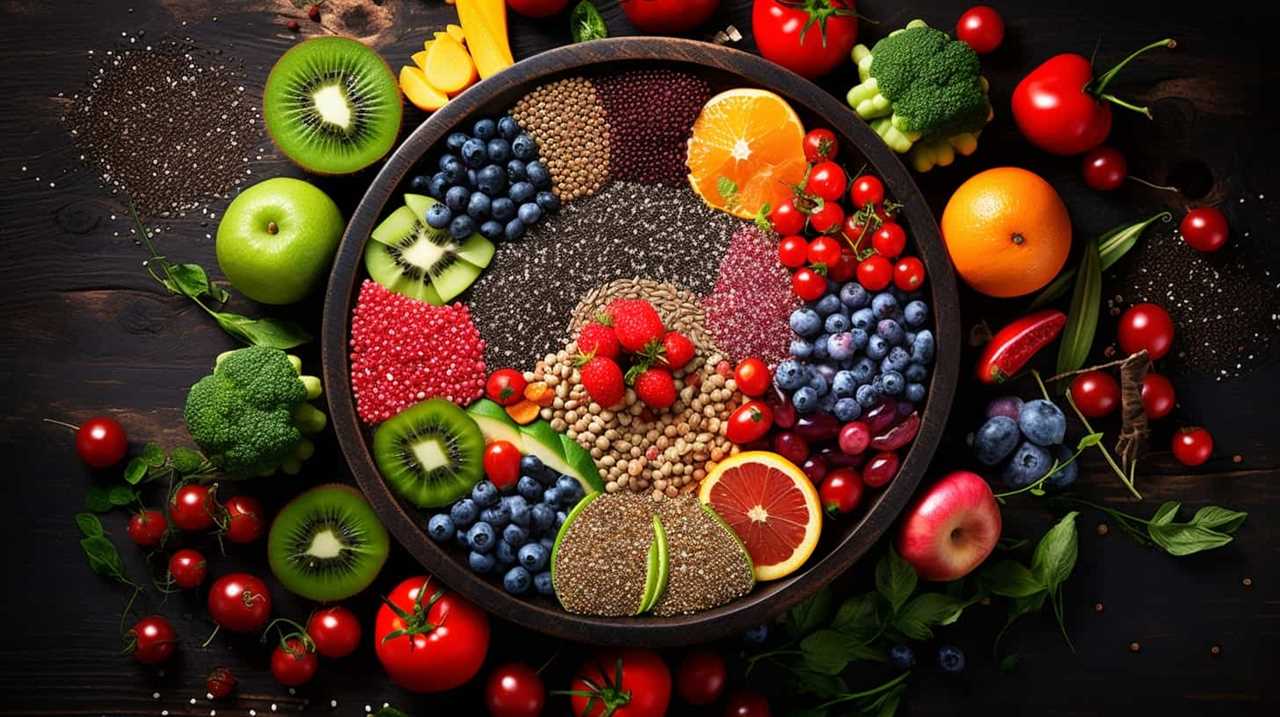
Common Chia Allergens
In our exploration of allergic reactions to superseeds, let’s delve into the common chia allergens and discover effective tips for avoiding chia seed allergens.
Chia seeds, although a popular superfood, can trigger allergic reactions in some individuals. It’s important to be aware of the common allergens associated with chia and take necessary precautions.
Here are three key things to consider:
-
Prevalence in adults: Chia seed allergies are relatively rare in adults compared to other food allergies. However, it’s essential to recognize the signs and symptoms of an allergic reaction and seek medical attention if needed.

-
Allergic reactions in pets: Chia seeds can also cause allergic reactions in pets, especially dogs. If you have a furry friend at home, be cautious when introducing chia seeds into their diet and monitor them for any adverse reactions.
-
Tips for avoiding chia seed allergens: To minimize the risk of allergic reactions, consider the following tips: read food labels carefully, avoid foods that contain chia seeds, inform your healthcare provider about your allergy, and keep emergency medication, such as antihistamines, on hand if necessary.
Cross-Reactivity With Other Foods
Let’s explore the cross-reactivity of chia seed allergens with other foods and discover effective tips for avoiding allergic reactions. Cross-reactivity occurs when someone with a chia seed allergy also reacts to similar proteins found in other foods. It is important to be aware of these potential cross-reactive allergens to prevent accidental exposure and minimize the risk of allergic reactions. Below is a table showcasing some common cross-reactive allergens and their prevalence rates:
| Cross-Reactive Allergen | Prevalence Rate |
|---|---|
| Sesame seeds | 30-50% |
| Sunflower seeds | 10-30% |
| Flax seeds | 10-20% |
To avoid hidden allergens, it is crucial to carefully read food labels and be familiar with alternative names for chia seed ingredients. Additionally, it is advisable to consult with a healthcare professional or allergist for personalized advice and guidance. By taking these precautions, individuals with chia seed allergies can reduce the risk of allergic reactions and enjoy a safe and healthy diet.

Substitutes for Chia Seeds?
Continuing our exploration of cross-reactivity with other foods, it’s important for us to discuss substitutes for chia seeds and share tips on how to avoid chia seed allergens. Chia seeds have gained popularity for their nutritional benefits, but for individuals with chia seed allergies, finding suitable alternatives is crucial. Here are a few substitutes to consider:
-
Flaxseeds: These tiny powerhouses are packed with omega-3 fatty acids and can be used in a similar way as chia seeds. They can be ground and added to smoothies, baked goods, or used as an egg substitute in recipes.
-
Hemp seeds: Rich in protein and healthy fats, hemp seeds can be sprinkled on salads, blended into smoothies, or used in baking.
-
Sunflower seeds: These seeds are a great source of vitamin E and can be used as a topping for yogurt, oatmeal, or added to trail mix.

If you experience symptoms such as hives, itching, or difficulty breathing after consuming chia seeds, it’s essential to seek medical advice. Treatment options may include antihistamines or, in severe cases, epinephrine. The prevalence of chia seed allergies is relatively low, but if you have a history of seed allergies, it’s important to be cautious.
Alternative Superseeds for Allergy Sufferers
We often find that allergy sufferers can still enjoy the benefits of superseeds by exploring alternative options. While chia seeds are a popular choice, there are several chia seed alternatives that can provide similar benefits.
One such alternative is flaxseed, which is rich in omega-3 fatty acids and fiber. Flaxseed can be ground and used in smoothies, baked goods, or sprinkled on top of yogurt or oatmeal.
Another alternative is hemp seeds, which are a great source of protein, omega-3 and omega-6 fatty acids, and minerals like magnesium and zinc. Hemp seeds can be added to salads, smoothies, or used as a topping for soups or roasted vegetables.

Sunflower seeds are also a viable option, offering a good source of vitamin E, magnesium, and selenium. They can be eaten on their own as a snack, added to trail mix, or used as a topping for salads or stir-fries.
Frequently Asked Questions
Are Chia Seed Allergies More Common in Children or Adults?
Chia seed allergies can occur in both children and adults. Symptoms may include hives, itching, and difficulty breathing. While prevalence rates vary, it’s important for individuals of all ages to be aware of potential allergic reactions when consuming superseeds.
Can Chia Seed Allergies Lead to Anaphylaxis?
Chia seed allergies can indeed lead to anaphylaxis, a severe and potentially life-threatening allergic reaction. Symptoms may include difficulty breathing, swelling, and a drop in blood pressure. Immediate treatment with epinephrine is crucial.
Is It Possible to Be Allergic to Multiple Superseeds, Including Chia Seeds?
Yes, it is possible to be allergic to multiple superseeds, including chia seeds. Cross reactivity between superseeds can occur, and genetics play a role in superseed allergies. It is important to be aware of these risks for proper management.

How Can Chia Seed Allergies Be Diagnosed?
To diagnose chia seed allergies, a doctor may perform skin prick tests or blood tests to check for specific IgE antibodies. Cross reactivity with other superseeds can also be assessed through these methods.
What Are Some Alternative Superseeds That Can Be Consumed by Individuals With Chia Seed Allergies?
Some alternative superseeds for individuals with chia seed allergies include flaxseeds, hemp seeds, and pumpkin seeds. Incorporating these superseeds into a balanced diet can provide numerous health benefits such as improved digestion and heart health.
Conclusion
In conclusion, while chia seeds are known for their numerous health benefits, it’s important to be aware of the potential allergic reactions they can cause. From mild symptoms to severe anaphylaxis, individuals, especially children, should be cautious when consuming chia seeds.
Cross-reactivity with other superseeds is also a concern. Proper diagnosis and management of chia seed allergies are crucial. For those with allergies, exploring alternative superseeds can be a safe and nutritious option.

Stay informed and prioritize your health.
Hi, I’m Sarah. I write for Turtle Tree Seeds, a news blog that loves food – all kinds of food. But especially bacon, chocolate, and veggies. We’re on a mission to show the world that you can enjoy all of those things, even kale and brussels sprouts. Because we believe that when it comes to food, there’s no such thing as guilty pleasures. Just pleasures.
I’m also a huge fan of puns (obviously).
Health Risks and Allergies Related to Chia Seeds
10 Best Ways to Navigate Seed-Related Dietary Allergies

We acknowledge the difficulties that arise when managing dietary allergies, especially those related to seeds. Don’t fret! We are here to assist with the top 10 strategies for coping with seed allergies.
From understanding symptoms to managing allergies at home, we’ll provide practical tips to help you stay healthy and informed.
So, sit back, relax, and let us guide you through this seed-filled journey.
Key Takeaways
- Understand the prevalence and symptoms of chia seed allergies
- Consult healthcare professionals for accurate diagnosis and guidance
- Avoid chia seeds and related products to manage allergies
- Explore alternative seeds such as flaxseeds, hemp seeds, pumpkin seeds, and sunflower seeds for nutritional benefits.
Understanding Chia Seed Allergies
Understanding the prevalence and symptoms of chia seed allergies is crucial for effectively managing seed-related dietary allergies. When it comes to chia seed allergies, it’s essential to identify the triggers that can cause an allergic reaction. Common triggers include the proteins found in chia seeds, such as albumin and globulin. These proteins can stimulate an immune response in sensitive individuals, leading to symptoms like hives, itching, and difficulty breathing.

To manage chia seed allergy symptoms, it’s important to avoid consuming chia seeds and any products that contain them. Reading food labels carefully and consulting with a healthcare professional can help in identifying potential hidden sources of chia seeds. By being vigilant and proactive, individuals with chia seed allergies can effectively manage their symptoms and prevent any potential allergic reactions.
In the next section, we’ll discuss the identifying symptoms of chia seed allergies.
Identifying Symptoms of Chia Seed Allergies
To accurately diagnose and manage chia seed allergies, it’s crucial that we recognize and understand the telltale symptoms associated with this specific dietary allergy. Identifying chia seed allergy symptoms is the first step towards managing chia seed allergies effectively.
Some common symptoms include hives, itching, and swelling of the skin. Digestive symptoms may include abdominal pain, nausea, vomiting, and diarrhea. Respiratory symptoms such as coughing, wheezing, and shortness of breath may also be present.

In severe cases, chia seed allergies can cause anaphylaxis, which is a life-threatening allergic reaction that requires immediate medical attention. It’s important to note that symptoms may vary from person to person, and some individuals may only experience mild reactions.
If you suspect a chia seed allergy, it’s recommended to consult with a healthcare professional for proper diagnosis and guidance on managing this dietary allergy effectively.
Diagnosing Chia Seed Allergies
Now let’s delve into how we can accurately diagnose chia seed allergies.
Diagnosing allergies can be challenging, but there are several methods that can help determine if someone is allergic to chia seeds.

The most common diagnostic tool is an allergy test, which can be done through a skin prick or blood test. These tests measure the body’s immune response to chia seed proteins.
Another method is an elimination diet, where chia seeds are removed from the diet for a period of time and then reintroduced to see if symptoms reoccur.
It’s important to consult with a healthcare professional for an accurate diagnosis. If diagnosed with a chia seed allergy, managing it at home involves avoiding chia seeds in all forms, including oils and supplements, and being cautious of cross-contamination.
Avoiding Chia Seeds in Your Diet
When it comes to avoiding chia seeds in your diet due to allergies, there are plenty of chia-free meal alternatives to consider. Incorporating other nutrient-rich seeds like flaxseeds or sunflower seeds can provide similar health benefits without the risk of an allergic reaction.

Additionally, managing chia seed allergies involves carefully reading food labels and being cautious of hidden sources of chia seeds in packaged products.
Chia-Free Meal Alternatives
Exploring alternative meals that don’t include chia seeds is essential for managing seed-related dietary allergies. Whether you’re allergic to chia seeds or simply want to avoid them in your diet, there are plenty of delicious meal options available. Here are three chia-free meal alternatives to consider:
-
Chia-Free Baking Recipes: Instead of using chia seeds as an egg substitute in baking, try alternatives like applesauce, mashed bananas, or flaxseed meal mixed with water. These ingredients can provide the same binding effect without the allergenic properties of chia seeds.
-
Chia Seed Substitutes: If you’re looking for a replacement in recipes that call for chia seeds, consider using ground flaxseeds, hemp seeds, or psyllium husk. These substitutes can offer similar nutritional benefits and add a pleasant texture to your dishes.

-
Explore New Ingredients: Embrace the opportunity to discover new ingredients that can enhance your meals. Quinoa, amaranth, and buckwheat are all nutritious alternatives that can be used in place of chia seeds in salads, porridge, or granola.
By incorporating these chia-free meal alternatives into your diet, you can still enjoy a variety of delicious and nutritious dishes while managing your seed-related dietary allergies.
Now, let’s delve into the next section on managing chia seed allergies.
Managing Chia Seed Allergies
To manage our seed-related dietary allergies, we can avoid chia seeds in our diet by being mindful of the ingredients we consume. Chia seeds are commonly found in many foods, such as smoothies, granola bars, and baked goods. It is important to read food labels carefully and avoid products that contain chia seeds or may have been cross-contaminated with them.

Understanding cross-contamination is crucial in managing chia seed allergies. Even trace amounts of chia seeds can trigger an allergic reaction in sensitive individuals. Therefore, it is essential to be cautious when dining out or eating pre-packaged foods.
If you have a chia seed allergy and are looking for substitutes, there are several options available. Flax seeds, hemp seeds, and pumpkin seeds can be used as alternatives in recipes. These seeds provide similar nutritional benefits and can add a crunchy texture to your meals.
By being vigilant about avoiding chia seeds and understanding cross-contamination risks, you can successfully manage your chia seed allergies and enjoy a safe and healthy diet.
| Chia Seed Allergy Management Tips | ||
|---|---|---|
| Read food labels carefully | Avoid cross-contamination | Substitute with flax, hemp, or pumpkin seeds |
| Be cautious when dining out | Understand the risks | Enjoy a safe and healthy diet |
Reading Food Labels for Chia Seed Allergens
In our quest to navigate seed-related dietary allergies, we must pay close attention to the food labels for any potential chia seed allergens. Reading food labels can be a valuable tool in identifying and avoiding allergens.

Here are three key things to look for when reading food labels for chia seed allergens:
-
Check the ingredient list: Look for chia seeds or any variations of the word, such as chia flour or chia oil. These ingredients should be clearly listed on the label.
-
Look for allergen warnings: Manufacturers often include allergen warnings, such as ‘may contain traces of chia seeds’ or ‘processed in a facility that also handles chia seeds.’ These warnings can help you make informed choices.
-
Be aware of hidden sources: Chia seeds can sometimes be used as a binding agent or thickening agent in processed foods. Look out for terms like ‘natural gums’ or ‘stabilizers,’ as these may indicate the presence of chia seeds.

Exploring Alternative Seed Options
When looking for alternative seed options to navigate seed-related dietary allergies, we can consider incorporating different types of seeds into our diet. Exploring seed alternatives is a great way to ensure a balanced and nutritious diet while avoiding allergens. There are various seeds available that can provide similar nutritional benefits as chia seeds. Here is a table showcasing some alternative seeds and their nutritional profiles:
| Seed Type | Nutritional Benefits |
|---|---|
| Flaxseeds | High in omega-3 fatty acids and fiber |
| Hemp seeds | Excellent source of protein and healthy fats |
| Pumpkin seeds | Rich in magnesium, iron, and antioxidants |
| Sunflower seeds | Good source of vitamin E and selenium |
| Sesame seeds | High in calcium, iron, and healthy fats |
Seeking Medical Advice for Chia Seed Allergies
We strongly recommend consulting a medical professional if you experience chia seed allergies. Seeking medical advice is crucial in order to properly diagnose and manage your allergies.
Here are some key reasons why seeking medical advice is important:
-
Accurate diagnosis: A medical professional can help identify whether your symptoms are truly caused by chia seed allergies or if there may be other underlying factors involved.
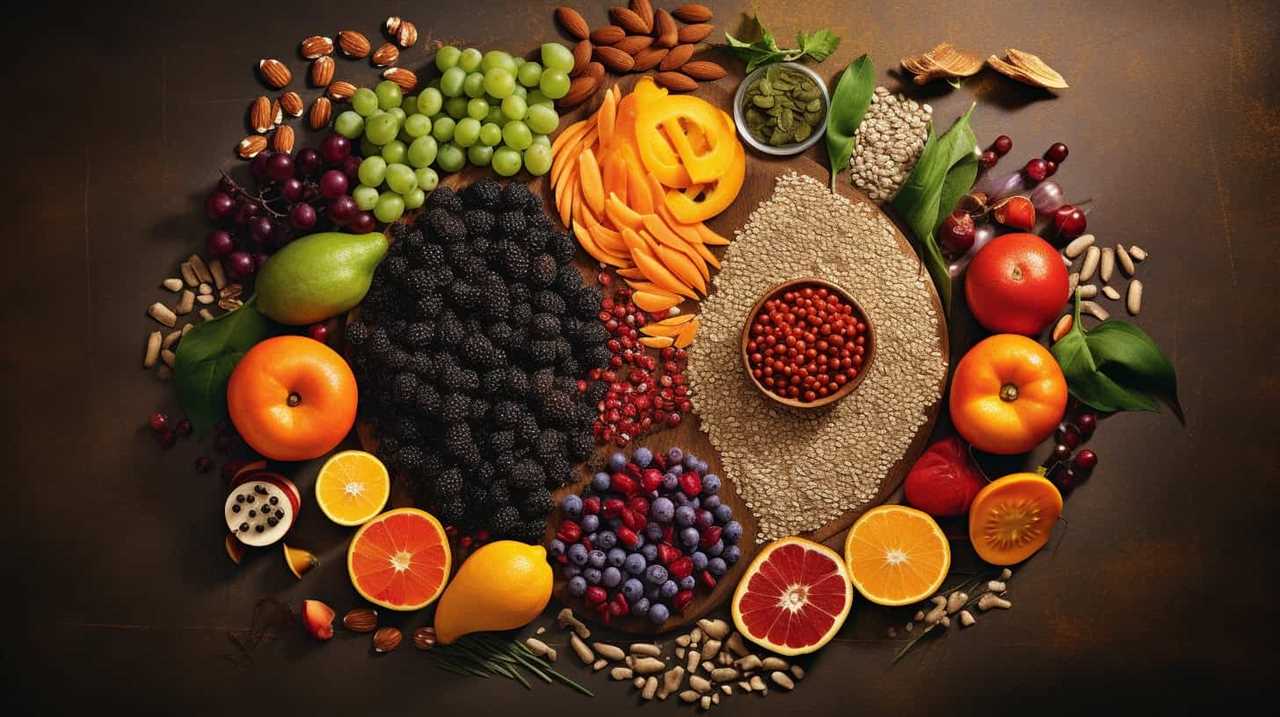
-
Allergy testing: A medical professional can conduct specific tests to determine if you’re indeed allergic to chia seeds. This can help guide your treatment plan and avoid unnecessary restrictions.
-
Treatment options: Seeking medical advice allows you to explore alternative treatments and coping strategies for chia seed allergies. Your doctor can provide personalized advice on how to manage your symptoms and prevent future reactions.
Managing Chia Seed Allergies at Home
At home, we can effectively manage chia seed allergies by implementing a combination of avoidance strategies and utilizing over-the-counter antihistamines.
Chia seed allergy symptoms can range from mild to severe and may include itching, hives, swelling, and difficulty breathing.

The first step in managing chia seed allergies is to avoid consuming any products that contain chia seeds. This includes reading food labels carefully and asking about ingredients when dining out. It may also be helpful to find chia seed allergy substitutes, such as flaxseeds or hemp seeds, which can provide similar nutritional benefits without triggering an allergic reaction.
Additionally, over-the-counter antihistamines can help alleviate symptoms of chia seed allergies, but it’s important to consult with a healthcare professional to determine the appropriate dosage and frequency of use.
Educating Others About Chia Seed Allergies
When it comes to chia seed allergies, it’s important to raise awareness through education. By informing others about the potential risks and symptoms associated with chia seed allergies, we can help prevent allergic reactions and promote a safer environment for those affected.
Communicating the importance of avoiding chia seeds and their derivatives in food products can also play a crucial role in educating others about this specific allergen.

Raising Awareness Through Education
We frequently educate others about chia seed allergies to raise awareness and promote understanding. Here are three important ways we do this:
-
Providing accurate information: We make sure to share evidence-based facts about chia seed allergies, including common symptoms, potential cross-reactivity with other seeds, and the importance of reading food labels carefully.
-
Sharing personal experiences: By sharing stories of individuals who’ve experienced chia seed allergies, we help others understand the impact it can have on someone’s life. Personal anecdotes can create empathy and encourage others to take allergies seriously.
-
Offering practical tips: We provide practical advice on how to navigate chia seed allergies in daily life. This includes tips on avoiding cross-contamination, finding alternative ingredients, and communicating effectively with friends, family, and dining establishments.

Communicating Allergic Risks
To effectively communicate allergic risks, we emphasize the importance of educating others about chia seed allergies. When it comes to allergy management, clear and concise communication is key. By sharing information about chia seed allergies, we can help prevent potentially dangerous situations and ensure the safety of those with allergies. To engage and inform others, we have prepared a table that outlines the common symptoms, potential risks, and management strategies for chia seed allergies.
| Symptoms | Potential Risks | Allergy Management |
|---|---|---|
| Hives | Anaphylaxis | Avoidance of chia seeds and products containing them |
| Swelling of the face, lips, or throat | Difficulty breathing | Always carry an epinephrine auto-injector |
| Nausea and vomiting | Life-threatening reaction | Educate others about chia seed allergies |
| Abdominal pain | Cross-reactivity with other seeds or grains | Read food labels carefully |
Living a Healthy Lifestyle With Chia Seed Allergies
Living a healthy lifestyle with chia seed allergies requires careful planning and consideration of alternative sources of nutrition. While chia seeds are known for their nutritional benefits, there are several substitutes that can be incorporated into your diet to maintain a nutritious and balanced eating plan.
Here are three options to consider:
-
Flaxseeds: Similar to chia seeds, flaxseeds are rich in omega-3 fatty acids and fiber. They can be used as a topping for yogurt, smoothies, or baked goods.

-
Hemp seeds: Hemp seeds are packed with protein, healthy fats, and minerals. They can be sprinkled on salads, added to granola, or used in homemade energy bars.
-
Sunflower seeds: Sunflower seeds are a great source of vitamin E, magnesium, and selenium. They can be eaten as a snack, added to trail mix, or used in baking.
Frequently Asked Questions
Can Chia Seeds Cause Anaphylaxis?
Chia seeds can potentially cause anaphylaxis in individuals who are allergic to them. Symptoms of chia seed allergies can include hives, swelling, difficulty breathing, and gastrointestinal distress. It’s important to be aware of potential cross-reactive allergens to chia seeds.
Are There Any Cross-Reactive Allergies Between Chia Seeds and Other Seeds?
Yes, there can be cross-reactive allergies between chia seeds and other seeds. It’s important to manage chia seed allergies, especially in individuals with multiple seed allergies, by avoiding all potential triggers.

Can Chia Seed Allergies Develop Later in Life?
Yes, chia seed allergies can develop later in life. Symptoms may include hives, itching, and difficulty breathing. Treatment involves avoiding chia seeds and using antihistamines or epinephrine for severe reactions.
Are There Any Hidden Sources of Chia Seeds in Processed Foods?
Yes, there can be hidden sources of chia seeds in processed foods, which can pose potential risks for individuals with chia seed allergies. It’s important to read food labels carefully and be aware of cross-contamination.
Can Chia Seeds Be Safely Consumed by Individuals With Other Seed Allergies?
Yes, chia seeds can be safely consumed by individuals with other seed allergies. However, it’s always best to consult with a healthcare professional. Chia seed alternatives, like flaxseeds or pumpkin seeds, can be used in gluten-free baking recipes.
Conclusion
In conclusion, navigating seed-related dietary allergies, such as chia seed allergies, can be challenging but not impossible. By understanding the symptoms, seeking medical advice, and making informed choices in our diet, we can manage these allergies and live a healthy lifestyle.

Remember, knowledge is power, and by educating ourselves and others about chia seed allergies, we can create a supportive and understanding environment.
With determination and resilience, we can overcome any dietary obstacle and thrive.
Hi, I’m Sarah. I write for Turtle Tree Seeds, a news blog that loves food – all kinds of food. But especially bacon, chocolate, and veggies. We’re on a mission to show the world that you can enjoy all of those things, even kale and brussels sprouts. Because we believe that when it comes to food, there’s no such thing as guilty pleasures. Just pleasures.
I’m also a huge fan of puns (obviously).
Health Risks and Allergies Related to Chia Seeds
10 Health Risks and Allergies From Seed Consumption

Are you aware of the potential health risks and allergic reactions associated with consuming seeds? We have compiled a list of ten key points to consider.
From choking hazards to digestive discomfort, allergic reactions to hormonal imbalances, there’s a lot to be aware of.
Our goal is to inform and protect, ensuring that you can make informed choices about your health.
So, let’s dive in and explore these risks together, empowering ourselves with knowledge for a healthier future.

Key Takeaways
- Seeds, especially small ones like sunflower or pumpkin seeds, pose a choking hazard, especially for young children. Parents and caregivers should always supervise children while they’re eating seeds and avoid giving seeds to children under the age of five.
- Some seeds, such as peanuts, tree nuts, and sesame seeds, can cause allergic reactions in certain individuals. Managing allergic reactions involves avoiding consumption of allergenic seeds and checking food labels for potential allergens.
- Consuming seeds can lead to blood pressure fluctuations, especially if the seeds contain high levels of sodium. Flaxseeds and chia seeds, rich in omega-3 fatty acids and fiber, can have a positive impact on blood pressure. However, they can also interfere with blood thinning medications, increasing the risk of complications and blood clotting.
- Seeds can cause gastrointestinal blockage if not chewed thoroughly before swallowing, especially when consumed in large quantities. Overeating seeds can contribute to weight gain due to their high calorie content. Some seeds contain compounds that can disrupt hormonal balance and potentially lead to weight gain and metabolic changes.
Choking Hazard
We need to address the choking hazard associated with seed consumption. Seeds, especially small ones like sunflower or pumpkin seeds, pose a strangulation risk, especially for young children. They can easily lodge in the throat and block the airway, leading to a life-threatening situation.
To prevent such incidents, it’s crucial to implement effective prevention strategies. First and foremost, parents and caregivers should always supervise children while they’re eating seeds. Additionally, it’s recommended to avoid giving seeds to children under the age of five, as they’re more likely to swallow them whole.
Furthermore, proper education about the dangers of seed consumption should be provided to both children and adults. By being aware of the risks and taking necessary precautions, we can ensure a safer environment for everyone.
Digestive Discomfort
The article explores the occurrence of digestive discomfort associated with the consumption of seeds. While seeds are often considered nutritious, some individuals may experience digestive issues after consuming them. Here are a few reasons why this discomfort may occur:

-
Food Sensitivities: Some people may have sensitivities or allergies to certain types of seeds, such as sesame or sunflower seeds. These sensitivities can lead to symptoms like bloating, stomach pain, or diarrhea.
-
Digestive Disorders: Individuals with digestive disorders, such as irritable bowel syndrome (IBS) or inflammatory bowel disease (IBD), may find that consuming seeds exacerbates their symptoms. The high fiber content in seeds can be difficult for their digestive systems to handle.
-
Improperly Prepared Seeds: Seeds that aren’t properly prepared or cooked can be harder to digest. Soaking, roasting, or cooking seeds can help break down their tough outer shells and make them easier on the digestive system.
Understanding the potential digestive discomfort associated with seed consumption is important for individuals with food sensitivities or digestive disorders. It’s always advisable to consult with a healthcare professional if you experience persistent digestive issues after consuming seeds.

Allergic Reactions
When it comes to seed consumption, it’s important to be aware of common allergenic seed types. Some seeds, such as peanuts, tree nuts, and sesame seeds, are known to cause allergic reactions in certain individuals.
Managing allergic reactions involves avoiding consumption of these allergenic seeds and being vigilant about checking food labels for potential allergens.
Common Allergenic Seed Types
Common allergenic seed types can cause allergic reactions in individuals. It’s important to be aware of these common allergens when incorporating seeds into our diets. Here are three common allergenic seed types to watch out for:
-
Peanuts: Despite their name, peanuts are actually legumes and are known to cause severe allergic reactions in some individuals. It’s crucial to read food labels carefully and avoid products that may contain peanuts or peanut oil.

-
Sesame Seeds: Sesame seeds are commonly used in cooking and baking, but they can trigger allergic reactions in some people. It’s important to check ingredient lists and be cautious when consuming foods that may contain sesame seeds.
-
Tree Nuts: Tree nuts, such as almonds, walnuts, and cashews, are popular ingredients in many recipes. However, they can cause allergies in some individuals. It’s advisable to be cautious when consuming products that may contain tree nuts.
Being aware of these common allergenic seed types can help individuals with allergies make informed choices when it comes to their diet and overall health.
Managing Allergic Reactions
To manage allergic reactions, we should be vigilant in reading food labels and avoiding ingredients that may contain common allergenic seed types. By being aware of these ingredients, we can take steps to prevent exposure and minimize the risk of allergic reactions. Additionally, it is important to know the symptoms of allergic reactions and how to manage them effectively. Some common symptoms include itching, hives, swelling, difficulty breathing, and gastrointestinal discomfort. If you experience any of these symptoms after consuming seeds or seed-containing products, it is crucial to seek medical attention immediately. Prevention strategies such as carrying an epinephrine auto-injector, wearing medical alert bracelets, and communicating your allergies to others can also help in managing symptoms and reducing the risk of severe allergic reactions.

| Symptoms | Management Strategies | Prevention Strategies |
|---|---|---|
| Itching | Apply cool compresses or over-the-counter anti-itch creams | Avoid contact with allergenic seeds |
| Hives | Take antihistamines or prescribed medications | Always read food labels for potential allergens |
| Swelling | Apply ice packs and seek medical attention if severe | Carry an epinephrine auto-injector and wear a medical alert bracelet |
| Difficulty breathing | Use prescribed inhalers or seek emergency medical care | Inform family, friends, and coworkers about your allergies |
| Gastrointestinal discomfort | Avoid trigger foods and consult a healthcare professional | Educate yourself on cross-contamination risks and prevention strategies |
Blood Pressure Fluctuations
We have observed that seed consumption can lead to variations in blood pressure. Proper blood pressure management is essential for maintaining cardiovascular health.
Here are three important considerations regarding blood pressure fluctuations:
-
Hypertension risk: Some seeds, such as pumpkin and sunflower seeds, contain high levels of sodium. Consuming these seeds in excess can contribute to elevated blood pressure levels, increasing the risk of hypertension.
-
Blood pressure-lowering effects: On the other hand, certain seeds, like flaxseeds and chia seeds, are rich in omega-3 fatty acids and fiber, which have been shown to have a positive impact on blood pressure. Including these seeds in a balanced diet may help lower blood pressure.

-
Individual response: It’s important to note that the effects of seed consumption on blood pressure can vary from person to person. Factors such as genetics, overall diet, and lifestyle habits can influence how seeds affect blood pressure.
Understanding the relationship between seed consumption and blood pressure fluctuations is crucial for maintaining cardiovascular health.
Now, let’s explore another important aspect: the potential interference with blood thinners.
Interference With Blood Thinners
Interfering with blood thinners is a significant concern when it comes to consuming seeds. Certain seeds, such as flaxseeds and chia seeds, contain high levels of omega-3 fatty acids, which have natural blood-thinning properties. This can potentially interfere with the effectiveness of blood thinning medications, leading to complications and increased risk of blood clotting.

It’s essential for individuals taking blood thinners to be cautious about their seed consumption and consult with their healthcare provider to ensure a safe and effective treatment plan.
Blood Clotting Concerns
Consuming seeds can pose potential risks for individuals taking blood thinners due to interference with the medication’s effectiveness. It’s important for those on blood thinners to be aware of the potential concerns related to seed consumption.
Here are three key points to consider:
-
Medication interactions: Some seeds, such as flaxseeds, chia seeds, and hemp seeds, contain omega-3 fatty acids, which have blood-thinning properties. When consumed in large amounts, these seeds can interfere with the effectiveness of blood thinners, increasing the risk of excessive bleeding or blood clotting.

-
Dosage and moderation: If you’re on blood thinners, it’s crucial to consult with your healthcare provider about the appropriate dosage and frequency of seed consumption. They can advise you on how to incorporate seeds into your diet while minimizing potential risks.
-
Monitoring and communication: Regular monitoring of blood clotting time and open communication with your healthcare provider are essential. This allows for adjustments in medication dosage or dietary recommendations to ensure optimal health and the prevention of blood clotting concerns.
Medication Interactions Possible
The potential risks of seed consumption for individuals taking blood thinners include medication interactions that can interfere with the effectiveness of the medication. Blood thinners, also known as anticoagulants, are prescribed to individuals with certain medical conditions to prevent the formation of blood clots. However, some seeds contain compounds that can interact with these medications, affecting their effectiveness.
Certain seeds, such as flaxseeds and chia seeds, contain high levels of omega-3 fatty acids and fiber, which are beneficial for overall health. However, these seeds also contain natural compounds called lignans, which have been found to have anticoagulant effects. This means that when consumed in large amounts, these seeds can potentially interfere with the medication’s ability to thin the blood effectively, increasing the risk of blood clots.

It is important for individuals taking blood thinners to be cautious with their seed consumption and consult with their healthcare provider. They should discuss any potential interactions and the appropriate amount of seeds they can safely consume. Monitoring medication effectiveness and potential side effects is crucial to ensure proper treatment and reduce the risk of complications.
Gastrointestinal Blockage
During digestion, seeds can potentially cause gastrointestinal blockage. This occurs when seeds, such as those from fruits, vegetables, or grains, become lodged in the digestive tract and obstruct the normal flow of food. Gastrointestinal blockage can lead to symptoms such as abdominal pain, bloating, nausea, and vomiting.
To prevent gastrointestinal discomfort and blockage from seed consumption, it’s important to take certain prevention measures:
- Chew seeds thoroughly before swallowing to break them down into smaller pieces that are easier to digest.
- Avoid consuming large quantities of seeds at once, as this increases the risk of blockage.
- Drink plenty of water when eating seeds to help facilitate their movement through the digestive system.
Hormonal Imbalances
Hormonal imbalances can have various effects on our health. One such effect is weight gain, as hormonal imbalances can disrupt our metabolism and lead to increased fat storage.
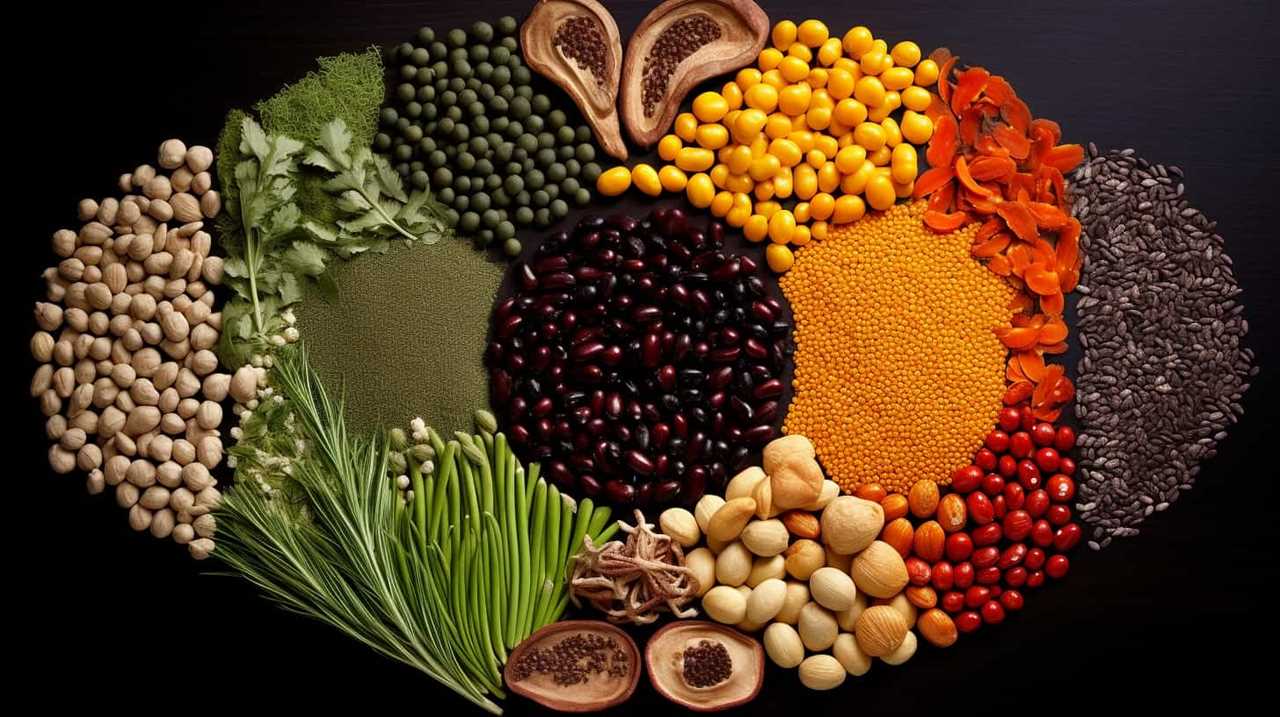
Additionally, hormonal imbalances can potentially cause fertility issues, making it more challenging for individuals to conceive.
Lastly, mood swings can also be impacted by hormonal imbalances, leading to emotional instability and affecting overall well-being.
It’s important to be aware of these potential risks and seek medical advice if experiencing symptoms related to hormonal imbalances.
Weight Gain Effects
How can seed consumption contribute to weight gain and disrupt our hormonal balance? While seeds are often touted for their health benefits, they can have unintended consequences on our weight and hormones. Here are three ways seed consumption can lead to weight gain and hormonal imbalances:

-
Increased calorie intake: Seeds are dense in calories, and consuming them in large quantities can contribute to weight gain. Even though they contain healthy fats, protein, and fiber, overeating seeds can lead to an excessive calorie intake, which can result in weight gain over time.
-
Imbalanced omega-6 to omega-3 ratio: Many seeds, such as sunflower and sesame seeds, have a high omega-6 fatty acid content, which can promote inflammation and disrupt hormonal balance when consumed in excess. Maintaining a balanced omega-6 to omega-3 ratio is crucial for optimal health and weight management.
-
Metabolic changes: Some seeds, like flaxseeds, contain compounds called lignans, which can have estrogen-like effects in the body. These compounds can potentially disrupt hormonal balance, leading to weight gain and other metabolic changes.
It’s important to consume seeds in moderation and be mindful of their calorie content and potential effects on hormonal balance. Always consult with a healthcare professional for personalized advice.

Fertility Issues Potential
Continuing the discussion from the previous subtopic, we can explore the potential fertility issues that may arise from seed consumption and its impact on hormonal imbalances.
When it comes to fertility, hormonal regulation plays a crucial role. Hormones such as estrogen and progesterone are essential for ovulation, conception, and maintaining a healthy pregnancy. Imbalances in these hormones can lead to difficulties in getting pregnant or maintaining a pregnancy.
While there’s limited research specifically linking seed consumption to fertility issues, some studies suggest that certain seeds, such as flaxseeds, may have phytoestrogenic properties that could potentially affect hormonal balance.
However, it’s important to note that more research is needed in this area to fully understand the impact of seed consumption on fertility. If you’re concerned about your fertility, it’s always best to consult with a healthcare professional who can provide personalized advice and guidance, including fertility treatment options if necessary.
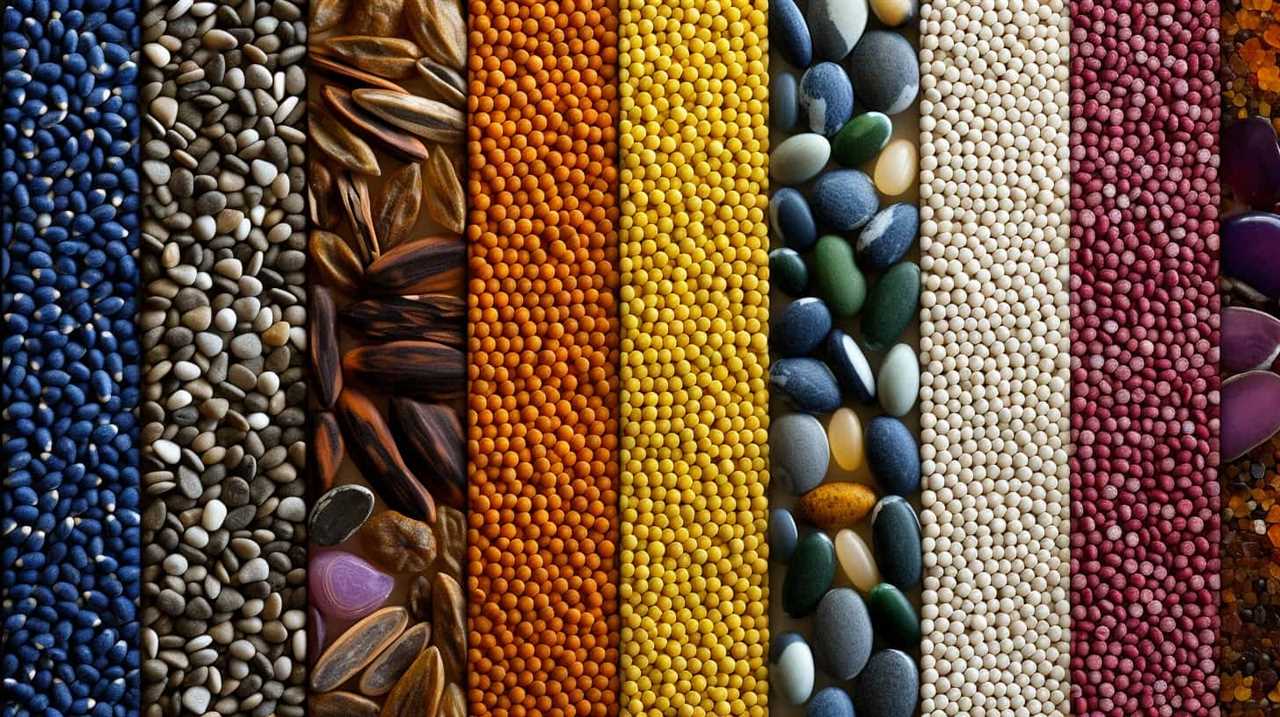
Mood Swings Impact
Seed consumption can have a significant impact on mood swings caused by hormonal imbalances. Hormones play a crucial role in regulating our mood, and any disruption in their balance can lead to mood swings and mental health implications.
Here are three ways in which seed consumption can affect mood swings:
-
Omega-3 fatty acids found in seeds, such as flaxseeds and chia seeds, have been shown to improve mood and reduce symptoms of depression and anxiety.
-
Seeds are rich in magnesium, a mineral that helps regulate serotonin levels in the brain. Serotonin is a neurotransmitter that plays a key role in mood regulation, and low levels have been associated with mood swings.

-
Seeds contain phytoestrogens, plant compounds that have estrogen-like effects in the body. These compounds can help balance hormone levels and alleviate mood swings caused by hormonal imbalances.
Nutrient Deficiencies
While consuming seeds, we should be aware of the potential health risks and allergies that can arise, including the possibility of nutrient deficiencies. Nutrient deficiencies can occur when our bodies don’t absorb enough essential vitamins and minerals from the foods we eat. Seeds, although nutrient-dense, contain substances that can interfere with nutrient absorption. For example, phytic acid, found in many seeds, can bind to minerals like iron, zinc, and calcium, making them less available for absorption in the body. Additionally, some individuals may experience an immune system response to certain proteins found in seeds, leading to inflammation and further impairing nutrient absorption.
It’s important to ensure a balanced diet and explore alternative sources of nutrients if seed consumption is limited. Transitioning into the subsequent section about dental issues, it’s worth noting that nutrient deficiencies can also impact our oral health.
Dental Issues
Exploring the impact of consuming seeds, we should be aware of the dental issues that can arise. Proper dental hygiene is essential for maintaining healthy teeth and gums, but certain seeds can pose a risk to oral health. Here are three dental issues that can be associated with seed consumption:

-
Tooth decay: Seeds, especially those with a high sugar content, can contribute to tooth decay. The bacteria in our mouths feed on sugar, producing acids that erode tooth enamel and lead to cavities.
-
Seed fragments: Consuming seeds without properly chewing them can result in seed fragments getting stuck between teeth or in the gum line, causing discomfort and potential infection.
-
Dental injuries: Biting down on hard seeds can cause dental injuries such as cracked or chipped teeth, leading to further complications.
By understanding the potential dental risks associated with seed consumption, we can take steps to maintain good dental hygiene and prevent these issues.

Transitioning to the subsequent section about potential drug interactions, it’s important to consider how seeds can interact with certain medications.
Potential Drug Interactions
When consuming seeds, it’s important to be aware of potential drug interactions. Certain seeds can interfere with the metabolism of certain drugs, affecting their effectiveness or causing harmful side effects.
For example, grapefruit seed extract contains compounds that can inhibit certain enzymes responsible for drug metabolism. This can lead to increased levels of the drug in the body, potentially causing toxicity or adverse reactions.
Similarly, flaxseed can interfere with the absorption of certain medications, such as blood thinners or cholesterol-lowering drugs.

It’s crucial to consult with a healthcare professional or pharmacist before consuming seeds if you’re taking any medications. They can provide guidance on potential interactions and recommend alternatives if necessary.
Being informed about potential drug interactions can help ensure your safety and the effectiveness of your medications.
Frequently Asked Questions
Can Seed Consumption Lead to Weight Gain or Obesity?
Seed consumption can contribute to weight gain or obesity due to its high calorie content. However, it can also promote satiety and improve metabolic health, making it a beneficial addition to a balanced diet.
Are There Any Specific Seeds That Are More Likely to Cause Allergies Than Others?
Seeds can trigger allergies in some individuals due to their interaction with the immune system. Factors like genetic predisposition and exposure can contribute to seed allergies. It’s important to be aware of potential risks and consult a healthcare professional if needed.

Can Eating Seeds Cause Hair Loss or Hormonal Imbalances?
Seed consumption does not cause hair loss or hormonal imbalances. However, there is a connection between seed consumption and fertility, as well as the potential for skin problems. It’s important to consume seeds in moderation and consult a healthcare professional if concerned.
What Are the Potential Dental Issues That Can Arise From Seed Consumption?
Oh, the joys of seed consumption! Did you know that it can lead to dental erosion and tooth decay? Yes, it’s true. So be mindful of your seed intake and take care of those pearly whites!
Do Certain Medications Interact Negatively With Seed Consumption?
Certain medications may interact negatively with seed consumption. It’s important to be aware of potential interactions between medications and seeds. Consult with a healthcare professional to ensure safe consumption of both medications and seeds.
Conclusion
In conclusion, consuming seeds can have various health risks and allergies that shouldn’t be taken lightly. From potential choking hazards and digestive discomfort to allergic reactions and blood pressure fluctuations, the consequences can be severe.

Additionally, seeds may interfere with blood thinners, cause hormonal imbalances, and lead to nutrient deficiencies. Dental issues and potential drug interactions are also concerns.
It’s crucial to be aware of these risks and consult with a healthcare professional before incorporating seeds into your diet.
Hi, I’m Sarah. I write for Turtle Tree Seeds, a news blog that loves food – all kinds of food. But especially bacon, chocolate, and veggies. We’re on a mission to show the world that you can enjoy all of those things, even kale and brussels sprouts. Because we believe that when it comes to food, there’s no such thing as guilty pleasures. Just pleasures.
I’m also a huge fan of puns (obviously).
-

 Chia Seeds3 months ago
Chia Seeds3 months agoCan Cats Have Chia Seeds?
-

 Chia Seeds3 months ago
Chia Seeds3 months agoHow Do Chia Seeds Go Bad?
-

 Chia Seeds3 months ago
Chia Seeds3 months agoDo Chia Seeds Make You Poop?
-

 Health Risks and Allergies Related to Chia Seeds3 months ago
Health Risks and Allergies Related to Chia Seeds3 months agoWhy Do Chia Seeds Gel
-

 Chia Seeds3 months ago
Chia Seeds3 months agoHow to Use Chia Seeds For Weight Loss
-

 Chia Seeds and Digestive Health2 weeks ago
Chia Seeds and Digestive Health2 weeks agoWhy Are Chia Seeds Beneficial For Gut Health?
-

 Chia Seeds in Gluten-Free Diets2 months ago
Chia Seeds in Gluten-Free Diets2 months agoYour Dependable Guide: Chia as a Gluten Substitute
-

 Chia Seeds3 months ago
Chia Seeds3 months agoHealth Benefits of Chia Seeds For Dogs


























